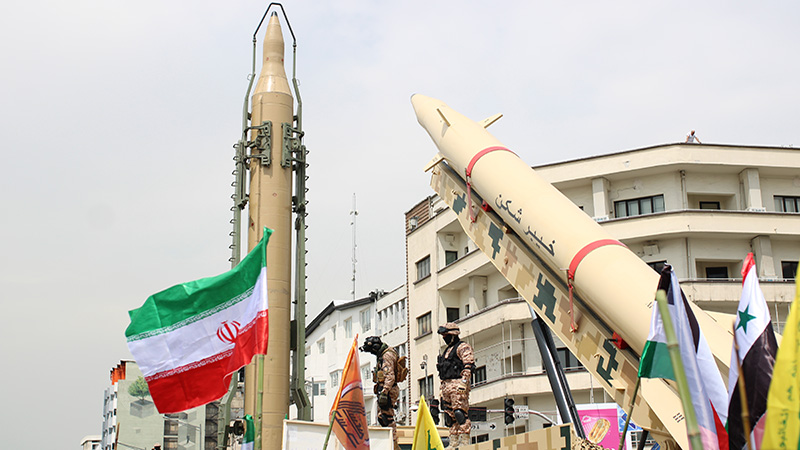On the Brink of a Wider War: The Geopolitical Imperative of Diplomacy in the Israel-Iran Conflict
By Atty. Arnedo S. Valera
International Human Rights Lawyer | Professor of International Security and AlliancesAs the second week of the escalating Israel-Iran conflict unfolds, the region stands on the precipice of a broader and deadlier war. Missiles and drones have crossed borders with disturbing frequency. Over 300 civilians have been reported dead or wounded, and thousands more have been injured in the crossfire—mostly in Iranian cities and nearby conflict zones.
In this atmosphere of mounting human tragedy and political brinkmanship, U.S. President Donald Trump has imposed a two-week decision deadline on whether or not to commit American forces to the conflict. This period of suspended action has neither deterred further violence nor comforted a world on edge. One must ask: Why wait two weeks—when every hour costs innocent lives and pushes the region closer to catastrophe?
The American People Say No to War
Polls from major institutions such as Pew Research Center and Quinnipiac University show that more than 60% of Americans oppose direct U.S. involvement in another war in the Middle East. Their message is clear: diplomacy must take precedence over another tragic misadventure. The collective memory of Iraq and Afghanistan—where trillions were spent and countless lives lost—still haunts the conscience of the American public.
And yet, this pause, framed as strategic deliberation, threatens to become a silent assent to escalation. The world does not need another reckless war; it needs immediate de-escalation and strategic diplomacy.
International Humanitarian Law: Noble in Principle, Fragile in Practice
The current hostilities have once again revealed the weak enforcement of International Humanitarian Law (IHL) and the Geneva Conventions, particularly the principle of distinction between civilians and combatants. Despite the advancements in military precision, real-world application has shown devastating results: residential buildings, schools, and hospitals have not been spared. Civilians remain the disproportionate victims.
Even as Israel claims military targets, and Iran responds in kind, the human cost is undeniable—and in many cases, unlawful. The silence of the United Nations, particularly the Security Council, underscores the failure of global governance at a time it is needed most.
Intelligence Denied, Escalation Enabled
Compounding the risk is President Trump’s skepticism toward U.S. intelligence assessments, which consistently reaffirm that Iran is not currently developing nuclear weapons. The most recent National Intelligence Estimate and IAEA reports confirm the absence of any verified nuclear breakout activity. To proceed with a preemptive military strike under these circumstances would not only be morally irresponsible but potentially illegal under international law, including Article 2(4) of the UN Charter, which prohibits the use of force unless in self-defense or with Security Council authorization.
To ignore these facts is to willfully step onto the path of unjustified preventive war, which has historically brought nothing but chaos.
A Roadmap to Peace: The Diplomatic Imperative
Time is not a luxury we can afford. We must act—not in war rooms, but at negotiation tables. Here is a strategic framework for immediate diplomatic intervention:
1. Immediate Ceasefire and De-escalation Measures
A UN-brokered ceasefire involving neutral mediators such as Switzerland, Norway, or Qatar.
Implementation of no-fly zones, missile deactivation agreements, and humanitarian corridors in affected areas.
2. Multilateral Peace Conference
A Geneva II-style Middle East Peace Conference including Iran, Israel, regional powers (Saudi Arabia, Turkey, Egypt, UAE), and global stakeholders (U.S., EU, Russia, China).
A return to and expansion of the Joint Comprehensive Plan of Action (JCPOA)—a nuclear agreement that, despite its flaws, worked.
3. Track II Diplomacy and Civil Society Engagement
Engage religious leaders, peacebuilders, and think tanks in Track II dialogues to reduce hostility and foster people-to-people diplomacy.
Encourage regional coalitions to establish a Middle East Non-Aggression Pact and a WMD-Free Zone.
The Role of the International Community and the Anti-War Movement
The United Nations, regional blocs, and civil society organizations must abandon neutrality in the face of injustice. The international community must speak with a unified voice to call for restraint and a negotiated settlement.
Simultaneously, the global anti-war movement must rise. Mass mobilizations, interfaith vigils, and digital campaigns must pressure governments to pursue diplomacy over destruction. The voices of peace—lawyers, students, workers, mothers—must become louder than the drums of war.
Legal, Political, and Moral Consequences
There is no legal, moral, or strategic justification for escalating this conflict. Under both U.S. law and international norms, any military engagement without Congressional authorization and without verifiable threat is unlawful. As held in Hamdi v. Rumsfeld (542 U.S. 507, 2004), even in matters of national security, due process and accountability must prevail.
The Martens Clause reminds us that when treaty law is silent, war must still be guided by the dictates of public conscience and the principles of humanity.
Humanity at the Crossroads
We are hurtling toward the threshold of no return. But there is still time. Let diplomacy be our weapon. Let negotiation be our shield. Let restraint, not retaliation, define our leadership.
To the leaders of the world: Do not let this conflict become the graveyard of our global order.
To the citizens of the world: Mobilize, speak, act—for peace, for justice, for life.
The missiles must stop. The dialogue must begin. Now.
"Blessed are the peacemakers, for they shall be called the children of God."
—Matthew 5:9
Atty. Arnedo S. Valera is the executive director of the Global Migrant Heritage Foundation and managing attorney at Valera & Associates, a US immigration and anti-discrimination law firm for over 32 years. He holds a master’s degree in International Affairs and International Law and Human Rights from Columbia University and was trained at the International Institute of Human Rights in Strasbourg, France. He obtained his Bachelor of Laws from Ateneo de Manila University. He is an AB-Philosophy Major at the University of Santo Tomas ( UST). He is a professor at San Beda Graduate School of Law (LLM Program), teaching International Security and Alliances

Comments
Post a Comment